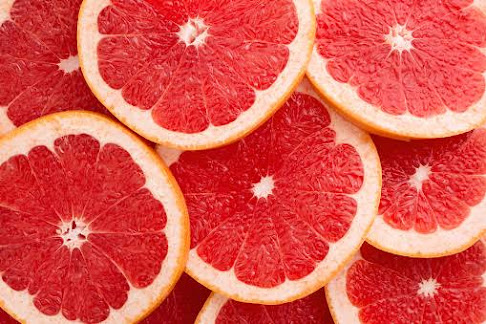Description :
Evergreen grapefruit trees typically grow to about 5-6 m (16-20 ft) tall, although they can reach 13-15 m (43-49 ft). The leaves are glossy, dark green, long (up to 15 cm (5.9 in)) and thin. Gives 5 cm (2 in.) White, four-petalled flowers. The fruit has a yellow-orange skin and a generally flattened spherical shape; its diameter ranges from 10 to 15 cm (3.9 to 5.9 inches). The flesh is segmented and sour, varying in color depending on the varieties, which include white, pink and red flesh of different sweetness (the redder varieties are usually the sweetest). The 1929 American "Ruby Red" (variety "Redblush") was the first grapefruit patent.
Grapefruit is a citrus fruit with a flavor that can range from bittersweet to sour. It contains a number of essential vitamins and minerals. People can eat the fruit whole or in the form of juice or pulp. Grapefruit first appeared in the 18th century as a result of crossing a pomelo and an orange. People called it "grapefruit" because it grows in clusters just like grapes. The nutrients in grapefruit can help keep skin healthy and protect against various diseases. They can also play a role in weight management. In this article, you will learn about some of the possible health benefits of grapefruit. Also, find out who should exercise caution when consuming grapefruit.
Nutrition :
200gm grapefruit contain :
- Calories : 64
- Protein : 1.3g
- Carbs : 16.2g
- Fiber : 2.2g
Vitamin & Minerals :
- Iron
- Calcium
- Magnesium
- Phosphorus
- Potassium
- Vitamin C
- Folate
- Vitamin A
- Thiamine
Benefits :
Good For Immune System :
Regular consumption of grapefruit can benefit your immune system. It is valued for its high content of vitamin C, which has antioxidant properties known to protect cells from harmful bacteria and viruses. In addition, several studies have shown that vitamin C is beneficial in helping you recover faster from a cold. Many of the other vitamins and minerals in grapefruits are good for immunity, including vitamin A, which has been shown to help protect against inflammation and several infectious diseases. Grapefruit also provides small amounts of vitamin B, zinc, copper, and iron, which work together in the body to support the functioning of the immune system. They also help maintain the integrity of the skin, which acts as a protective barrier against infection.
Weight Loss Friendly Food :
It has several weight loss properties, especially fiber content, which helps promote satiety and reduce caloric intake. In addition, grapefruit is low in calories but high in water, another feature known to help with weight loss. One study in 91 obese people found that those who consumed half a fresh grapefruit before meals lost significantly more weight than those who did not. In fact, those in the group who ate fresh grapefruit lost an average of 3.5 pounds (1.6 kg) over 12 weeks, while group participants who did not eat grapefruit lost an average of less than 1 pound (0.3 kg). . Other studies have found similar weight loss effects. For example, one study found that participants experienced reduced waist circumference when consuming grapefruit with meals daily. This doesn't mean that grapefruit will make you lose weight on its own, but adding it to an already healthy diet can prove effective. beneficial.
Improve Heart Health :
Regular consumption of grapefruit is believed to improve heart health by reducing risk factors for heart disease, such as high blood pressure and cholesterol. In one study, people who ate grapefruit three times a day for six weeks experienced significant reductions in blood pressure over the course of the study. They also showed an improvement in total cholesterol and "bad" LDL cholesterol. These effects
Reduce the Risk of Kidney Stones :
Consuming grapefruit can reduce the risk of developing kidney stones that result from a build-up of waste materials in the kidneys. These wastes are metabolic products that are normally filtered by the kidneys and removed from the body in the urine. However, when they crystallize in the kidneys, they become stones. Larger kidney stones can block the urinary system, which can be extremely painful. The most common type of kidney stones are calcium oxalate stones. Citric acid, an organic acid found in grapefruits, can be effective in preventing it by attaching to calcium in the kidneys and flushing it out of the body. Citric acid also has the ability to increase the volume and pH of urine, creating an environment less favorable for the formation of kidney stones.




